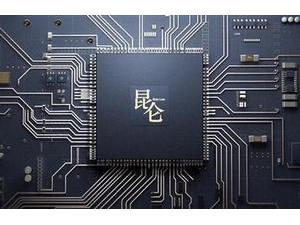



Date:27/12/19
 Chinese internet powerhouse Baidu announced Wednesday that it has established a partnership with Samsung Electronics for its first cloud-to-edge artificial intelligence chip Baidu Kunlun, which has been developed and is slated for mass production early next year.
Chinese internet powerhouse Baidu announced Wednesday that it has established a partnership with Samsung Electronics for its first cloud-to-edge artificial intelligence chip Baidu Kunlun, which has been developed and is slated for mass production early next year.
This makes Baidu the second Chinese internet company to launch their in-house developed chips. Alibaba Group Holding debuted its Hanguang 800 in September and has applied it internally in Alibaba's business operations, especially in product search and automatic translation functions on e-commerce sites, personalized recommendations, advertising and intelligent customer services.
In the first foundry partnership between the two, Baidu will provide advanced AI platforms to maximize the performance of AI, while Samsung will apply its foundry manufacturing technologies to high-performance computing chips, which are dedicated to edge computing as well as cloud computing, an area in which Baidu has been trying to catch up with its local rivals including Alibaba and Tencent Holdings.
The Kunlun chip will be built based on Baidu's advanced XPU, which is a neural processor architecture Baidu independently developed for cloud, edge, and AI scenarios. The chip will be made with Samsung's 14-nanometer fabrication technology and Interposer-Cube package solution, Samsung said.
Baidu unveiled China's first cloud-to-edge AI chip, Kunlun, in July 2018, including a training chip 818-300 and an inference chip 818-100. In addition, the new chip allows Baidu's pre-training natural language processing model named Ernie to infer three times faster than a traditional graphics processing unit or field-programmable gate array model.
Baidu has already begun to work with FPGA chips designed for deep learning since 2011. After the release of Kunlun last year, the Chinese tech giant has joined the ranks of Google, Nvidia, Intel, and many other tech companies that manufacture processors for AI.
The ongoing trade war between the U.S. and China has shone a light on China's chip dependence on foreign technologies. Local companies including Huawei, which is in the crosshairs of the Sino-U.S. trade spat, Alibaba, and now Baidu have all been working on their substitutes for exported chips.
Baidu and Samsung team up for mass production of AI chip
 Chinese internet powerhouse Baidu announced Wednesday that it has established a partnership with Samsung Electronics for its first cloud-to-edge artificial intelligence chip Baidu Kunlun, which has been developed and is slated for mass production early next year.
Chinese internet powerhouse Baidu announced Wednesday that it has established a partnership with Samsung Electronics for its first cloud-to-edge artificial intelligence chip Baidu Kunlun, which has been developed and is slated for mass production early next year.This makes Baidu the second Chinese internet company to launch their in-house developed chips. Alibaba Group Holding debuted its Hanguang 800 in September and has applied it internally in Alibaba's business operations, especially in product search and automatic translation functions on e-commerce sites, personalized recommendations, advertising and intelligent customer services.
In the first foundry partnership between the two, Baidu will provide advanced AI platforms to maximize the performance of AI, while Samsung will apply its foundry manufacturing technologies to high-performance computing chips, which are dedicated to edge computing as well as cloud computing, an area in which Baidu has been trying to catch up with its local rivals including Alibaba and Tencent Holdings.
The Kunlun chip will be built based on Baidu's advanced XPU, which is a neural processor architecture Baidu independently developed for cloud, edge, and AI scenarios. The chip will be made with Samsung's 14-nanometer fabrication technology and Interposer-Cube package solution, Samsung said.
Baidu unveiled China's first cloud-to-edge AI chip, Kunlun, in July 2018, including a training chip 818-300 and an inference chip 818-100. In addition, the new chip allows Baidu's pre-training natural language processing model named Ernie to infer three times faster than a traditional graphics processing unit or field-programmable gate array model.
Baidu has already begun to work with FPGA chips designed for deep learning since 2011. After the release of Kunlun last year, the Chinese tech giant has joined the ranks of Google, Nvidia, Intel, and many other tech companies that manufacture processors for AI.
The ongoing trade war between the U.S. and China has shone a light on China's chip dependence on foreign technologies. Local companies including Huawei, which is in the crosshairs of the Sino-U.S. trade spat, Alibaba, and now Baidu have all been working on their substitutes for exported chips.
Views: 431
©ictnews.az. All rights reserved.Similar news
- Azerbaijani project to monitor disease via mobile phones
- Innovative educational system to be improved under presidential decree
- NTRC prolongs license of two TV and radio organizations for 6 years
- Azerbaijan establishes e-registry for medicines
- Azerbaijani museum introduces e-guide
- Nar Mobile opens “Nar Dunyasi” sales and service center in Siyazan city
- International conference on custom electronic services held in Baku
- OIC secretary general to attend COMSTECH meeting in Baku
- Azerbaijan develops earthquake warning system
- New law to regulate transition to digital broadcasting in Azerbaijan
- Azerbaijani State Social Protection Fund introduces electronic digital signature
- Intellectual traffic management system in Baku to be commissioned in December
- Tax Ministry of Azerbaijan started receiving video-addresses
- World Bank recommends Azerbaijan to speed up e-service introduction in real estate
- Azerbaijan to shift to electronic registration of real estate





















